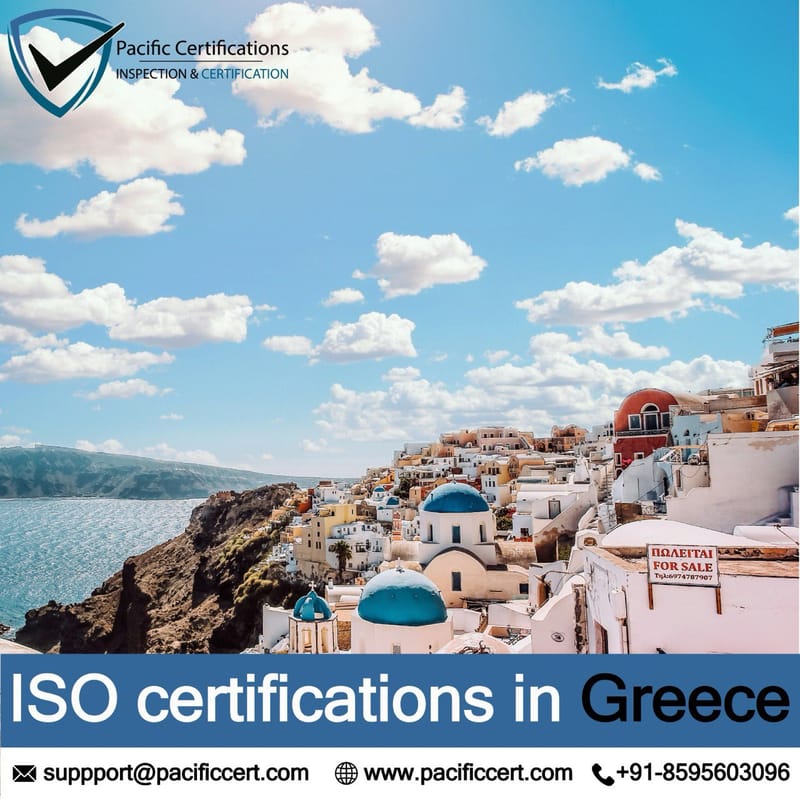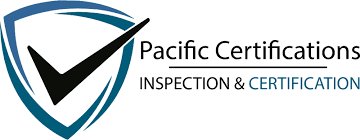ISO Certifications in Greece, Popular Standards, Requirements and Benefits

Introduction
ISO certifications play a vital role in ensuring quality, safety, efficiency, and consistency across various industries. In Greece, the demand for ISO certifications has been steadily increasing as businesses strive to meet international standards and improve their competitive edge. This comprehensive guide explores the importance of ISO certifications in Greece, the applicable ISO standards, and how Pacific Certifications can assist with audit and certification processes.
The Growing Demand for ISO Certifications in Greece
The Greek market has shown a significant uptick in the year 2024, in the adoption of ISO standards across multiple sectors. According to recent market research, industries such as manufacturing, healthcare, information technology, and food safety are among the top sectors seeking ISO certifications. This trend aligns with the global movement towards standardization and quality assurance, driven by consumer expectations and regulatory requirements
Key ISO Standards for Businesses in Greece
ISO 9001:2015 - Quality Management Systems:
ISO 9001 sets out the criteria for a quality management system and is based on several quality management principles including a strong customer focus, the motivation and implication of top management, the process approach, and continual improvement
ISO 14001:2015 - Environmental Management Systems:
This standard specifies the requirements for an effective environmental management system (EMS). It provides a framework that an organization can follow, rather than establishing environmental performance requirements
ISO 45001:2018 - Occupational Health and Safety Management Systems:
ISO 45001 provides a framework to improve employee safety, reduce workplace risks, and create better, safer working conditions
ISO 27001:2022 - Information Security Management Systems:
This standard helps organizations manage the security of assets such as financial information, intellectual property, employee details, or information entrusted by third parties
ISO 22000:2018 - Food Safety Management Systems:
ISO 22000 sets out the requirements for a food safety management system and can be certified to it. It maps out what an organization needs to do to demonstrate its ability to control food safety hazards
Click here to find out more applicable standards to your industry
How we at Pacific Certifications can assist?
We at Pacific Certifications are committed to helping organizations in Greece achieve ISO certification, ensuring they meet the rigorous standards set forth by the ISO
Certification Process
Initial Audit:
We conduct a thorough initial audit to assess the current state of your management system against the applicable ISO standards. This helps identify any areas that require improvement.
Certification Audit:
Following the initial audit, we perform a detailed certification audit. Our experienced auditors evaluate the effectiveness of your management system and its compliance with the ISO standard
Issuance of Certification:
Upon successful completion of the certification audit, Pacific Certifications issues an ISO certificate, validating your organization's commitment to quality, safety, and efficiency
Surveillance Audits:
To ensure ongoing compliance, we conduct regular surveillance audits. These audits verify that your management system continues to meet the ISO standard requirements
As businesses in Greece continue to embrace international standards, ISO certifications have become a crucial part of their strategy to improve quality, safety, and efficiency. With our expertise and commitment to excellence, we help businesses navigate the path to ISO certification, ensuring they meet global standards and achieve long-term success
For more information on how Pacific Certifications can assist with your ISO certification needs, please contact us at [email protected]!
Requirements of ISO Certifications in Greece
Organizations looking to achieve ISO certification in Greece must align their management systems with the specific requirements of the chosen ISO standard. Here's a general outline of the requirements for several key ISO certifications:
ISO 9001:2015 - Quality Management Systems Requirements
- Leadership and commitment from top management.
- Customer focus to ensure customer requirements are understood and met.
- Quality policy and objectives integrated into business processes.
- Risk-based thinking and process approach to manage processes and potential issues effectively.
- Continuous improvement as a permanent objective of the organization.
ISO 14001:2015 - Environmental Management Systems Requirements
- Environmental policy developed by top management that is compatible with the organization's context and strategic direction.
- Assessment of environmental aspects and impacts related to its activities, products, and services.
- Compliance obligations related to environmental aspects.
- Operational planning and control to manage environmental aspects effectively.
- Performance evaluation and continuous improvement in environmental performance.
ISO 45001:2018 - Occupational Health and Safety Management Systems Requirements
- Leadership and worker participation to ensure a safe and healthy workplace.
- Hazard identification and risk assessment processes.
- Operational controls to manage health and safety risks.
- Emergency preparednessand response plans.
- Monitoring, measurement, analysis, and performance evaluation to ensure continual improvement of the OH&S management system.
ISO 27001:2022 - Information Security Management Systems Requirements
- Establishment of an Information Security Management System (ISMS) including policies, objectives, and processes.
- Risk assessment and treatment regarding information security.
- Information security controls tailored to the needs of the organization following a risk assessment.
- Monitoring and measurement of ISMS performance.
- Continual improvement based on objective measurements.
Organizations in Greece aiming to obtain ISO certification must:
- Develop and implement a management system that meets the ISO standard’s requirements.
- Document processes, policies, and procedures required by the standard and those necessary for the effective planning, operation, and control of its processes.
- Conduct internal audits to ensure the system is functioning properly and to identify areas for improvement.
- Undergo an external audit performed by a credible certification body like Pacific Certifications, which can assess conformity to the standard and identify any non-conformities.
We can support organizations in Greece through the certification process by providing expertise and guidance in preparing for the audit, ensuring that the management systems are adequately documented, implemented, and maintained, as well as assisting with the continual improvement post-certification!
Benefits of ISO Certifications in Greece
ISO certifications are particularly valuable in a diverse economic landscape like Greece, where businesses range from small and medium enterprises to large corporations in sectors like tourism, shipping, agriculture, and manufacturing. Here are some of the key benefits:
Enhanced Credibility and Recognition
ISO certifications are internationally recognized. Holding such certifications demonstrates to customers, stakeholders, and regulators that the organization adheres to globally respected practices. This is especially important in Greece, where businesses often engage with international partners and markets.
Improved Efficiency and Reduced Waste
ISO standards, such as ISO 9001 for quality management, require organizations to define and streamline their processes. This leads to more efficient resource use, reduced waste, and cost savings. Streamlined operations are crucial in maintaining competitiveness, particularly for Greek businesses facing economic pressures.
Access to New Markets
Many industries and regions require suppliers to have specific ISO certifications as a prerequisite for doing business. ISO certifications can open doors to new markets, both within the EU and globally, by meeting these contractual and regulatory requirements.
Enhanced Customer Satisfaction
ISO standards focus heavily on meeting customer requirements and improving customer satisfaction. By adopting ISO 9001, for instance, companies can enhance product and service quality consistently, leading to higher customer retention and loyalty.
Better Risk Management
Standards like ISO 27001 for information security and ISO 45001 for occupational health and safety provide frameworks for identifying, managing, and reducing risks. Implementing these standards helps Greek organizations pre-empt operational disruptions and secure data, a critical factor in today's digital age.
Environmental Sustainability
ISO 14001 helps organizations reduce their environmental impact, promoting sustainability. This is increasingly important as consumers and regulators alike are demanding more environmentally friendly practices. For Greece, a country heavily reliant on tourism and agriculture, sustainable practices can also serve as a significant market differentiator.
Improved Employee Engagement and Safety
Certifications such as ISO 45001 improve workplace safety, which in turn boosts employee morale and reduces downtime due to accidents and health issues. A safer workplace also attracts and retains employees more effectively.
Compliance and Legal Advantages
Adhering to ISO standards helps organizations comply with statutory and regulatory requirements, reducing the risk of legal issues. For example, ISO 27001 can help comply with data protection regulations, which is crucial for avoiding fines and legal complications.
Facilitates Continuous Improvement
ISO standards require ongoing evaluation and improvement, ensuring that businesses continue to refine their processes and output. This focus on continual improvement helps organizations in Greece stay dynamic and responsive to changes in market conditions and technology
Overall, ISO certifications are a powerful tool for Greek organizations aiming to enhance their operational effectiveness, enter new markets, and meet international standards
Which industries need ISO Certifications in Greece?
In Greece, certain industries find particular value in obtaining ISO certifications either due to regulatory requirements, market demands, or the need to enhance operational efficiencies. Here are some of the key industries in Greece where ISO certifications are especially pertinent:
Manufacturing:
Manufacturers in Greece can benefit from ISO 9001 (Quality Management Systems) to improve process efficiency and product quality. ISO 14001 (Environmental Management Systems) is also crucial for minimizing environmental impact and complying with EU environmental regulations.
Information Technology:
For IT companies, ISO 27001 (Information Security Management Systems) is essential to protect sensitive data and comply with data protection laws, such as the EU General Data Protection Regulation (GDPR). This certification is critical for building trust with clients and partners regarding data security.
Healthcare:
Healthcare providers in Greece can enhance patient safety and service quality through ISO 9001 and ISO 13485 (Medical Devices). Additionally, ISO 45001 (Occupational Health and Safety Management Systems) is crucial for ensuring the safety of healthcare workers.
Tourism and Hospitality:
This sector is a major part of the Greek economy. ISO 9001 can help hotels, travel agencies, and related businesses improve customer satisfaction. ISO 22000 (Food Safety Management) is also critical for establishments that handle food and beverages, ensuring safety and compliance with health regulations.
Construction and Engineering:
ISO 9001 and ISO 45001 are important for the construction industry to ensure quality management and occupational health and safety. ISO 14001 helps companies reduce environmental impact and comply with stringent environmental regulations.
Transportation and Logistics:
Companies in this sector benefit from ISO 9001 for quality management and ISO 14001 for environmental management. ISO 45001 is also essential for ensuring the safety of workers in potentially hazardous environments like warehousing and transport.
Energy:
For energy companies, particularly those involved in renewable energy, ISO 14001 and ISO 50001 (Energy Management Systems) are important for managing environmental impact and improving energy efficiency, which are critical in a country like Greece with significant investments in solar and wind energy.
Agriculture and Food Production:
ISO 22000 is crucial for food producers to ensure food safety. Additionally, ISO 14001 can help agriculture businesses manage their environmental footprint effectively, which is vital for sustainability in this sector.
Education:
Educational institutions can implement ISO 9001 to improve their operational processes and enhance student satisfaction through better educational services.
By adopting ISO certifications, these industries not only enhance their operational excellence and compliance with international standards but also significantly boost their competitiveness both in domestic and international markets
Pacific Certifications is accredited by ABIS, in case you need support with ISO certification for your business in Greece, please contact us at [email protected] or +91-8595603096
Ready to get ISO certified?
Contact Pacific Certifications to begin your certification journey today!
Suggested Certifications –
Read more: Pacific Blogs

